英语学困生帮扶计划
- 格式:doc
- 大小:111.00 KB
- 文档页数:5
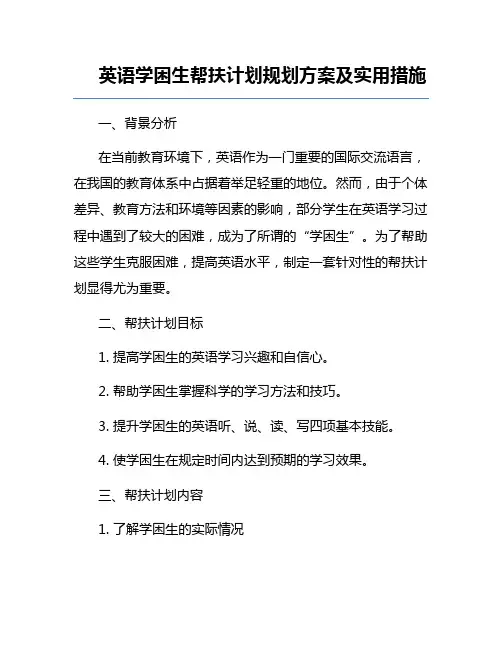
英语学困生帮扶计划规划方案及实用措施一、背景分析在当前教育环境下,英语作为一门重要的国际交流语言,在我国的教育体系中占据着举足轻重的地位。
然而,由于个体差异、教育方法和环境等因素的影响,部分学生在英语学习过程中遇到了较大的困难,成为了所谓的“学困生”。
为了帮助这些学生克服困难,提高英语水平,制定一套针对性的帮扶计划显得尤为重要。
二、帮扶计划目标1. 提高学困生的英语学习兴趣和自信心。
2. 帮助学困生掌握科学的学习方法和技巧。
3. 提升学困生的英语听、说、读、写四项基本技能。
4. 使学困生在规定时间内达到预期的学习效果。
三、帮扶计划内容1. 了解学困生的实际情况(1)进行学生档案分析,了解学困生的学习基础、兴趣、性格等信息。
(2)与学生进行面对面交流,了解他们在英语学习中的具体困难。
(3)与家长沟通,了解家庭教育和环境对学困生英语学习的影响。
2. 制定个性化的学习方案(1)针对学困生的实际情况,制定合适的学习目标。
(2)选择适合学困生的教材和辅助资料。
(3)设计具有趣味性和挑战性的学习任务。
3. 实施帮扶措施以下为具体的帮扶措施及实用内容:(1)激发学习兴趣通过生动有趣的教学活动,如英语角、英语歌曲学唱、英语电影欣赏等,激发学困生的学习兴趣。
创设轻松愉快的学习氛围,使学困生在愉悦的情感状态下学习英语。
(2)提高学习效率教授学困生科学的学习方法,如词汇记忆技巧、阅读理解策略等。
培养学困生的自主学习能力,让他们在学习过程中逐步实现自我监控和调整。
(3)强化基础知识对学困生进行系统的基础知识梳理,巩固他们的语法、词汇等基本知识。
设计针对性的练习题,帮助学困生查漏补缺。
(4)提升听说能力组织学困生参加英语口语训练,提高他们的口语表达能力。
利用多媒体教学手段,如英语听力软件、在线课程等,提高学困生的听力水平。
(5)培养阅读和写作能力为学困生提供适合他们水平的阅读材料,培养他们的阅读兴趣和能力。
设计有趣的写作任务,如英语日记、小作文等,提高学困生的写作水平。
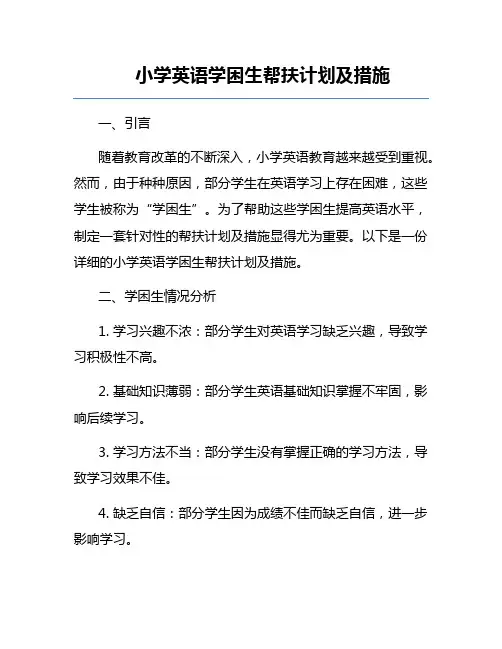
小学英语学困生帮扶计划及措施一、引言随着教育改革的不断深入,小学英语教育越来越受到重视。
然而,由于种种原因,部分学生在英语学习上存在困难,这些学生被称为“学困生”。
为了帮助这些学困生提高英语水平,制定一套针对性的帮扶计划及措施显得尤为重要。
以下是一份详细的小学英语学困生帮扶计划及措施。
二、学困生情况分析1. 学习兴趣不浓:部分学生对英语学习缺乏兴趣,导致学习积极性不高。
2. 基础知识薄弱:部分学生英语基础知识掌握不牢固,影响后续学习。
3. 学习方法不当:部分学生没有掌握正确的学习方法,导致学习效果不佳。
4. 缺乏自信:部分学生因为成绩不佳而缺乏自信,进一步影响学习。
5. 家庭教育缺失:部分学生的家庭教育环境不利于英语学习。
三、帮扶计划及措施1. 建立良好的师生关系(1)尊重学生,关心学生:教师应以平等、尊重的态度对待学困生,关心他们的生活和学习,帮助他们树立自信。
(2)耐心倾听,及时沟通:教师应耐心倾听学生的心声,了解他们的困难和需求,及时与学生沟通,帮助他们解决问题。
2. 激发学习兴趣(1)创设生动有趣的课堂氛围:教师应运用多种教学手段,如歌曲、游戏、故事等,创设生动有趣的课堂氛围,激发学生的学习兴趣。
(2)开展课外活动:组织英语角、英语竞赛、英语话剧等活动,让学生在轻松愉快的氛围中学习英语。
3. 夯实基础知识(1)加强语音教学:针对学困生的语音问题,教师应加强语音教学,帮助他们掌握正确的发音方法。
(2)巩固词汇:通过词汇卡片、单词接龙、猜词游戏等方式,帮助学生积累词汇。
(3)强化语法教学:教师应注重语法知识的传授,让学生在理解的基础上运用语法。
4. 优化学习方法(1)指导学生制定学习计划:教师应指导学生根据自己的实际情况制定学习计划,合理安排学习时间。
(2)培养良好的学习习惯:教师应教育学生按时完成作业,认真复习,养成积极主动学习的习惯。
(3)开展学习方法指导:教师可定期开展学习方法讲座,帮助学生掌握有效的学习策略。
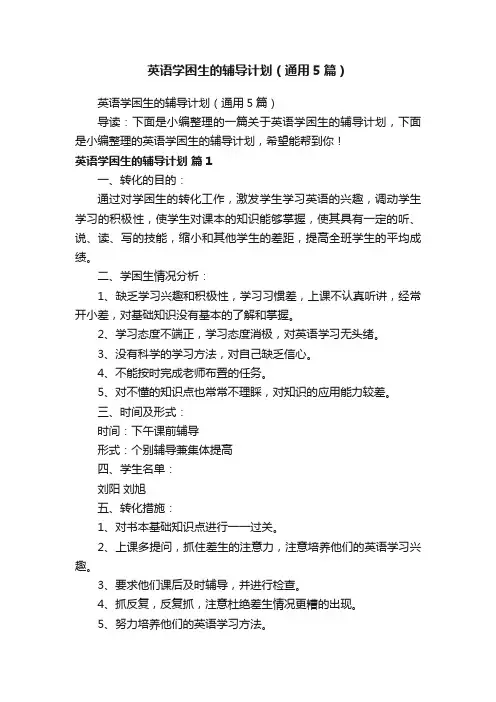
英语学困生的辅导计划(通用5篇)英语学困生的辅导计划(通用5篇)导读:下面是小编整理的一篇关于英语学困生的辅导计划,下面是小编整理的英语学困生的辅导计划,希望能帮到你!英语学困生的辅导计划篇1一、转化的目的:通过对学困生的转化工作,激发学生学习英语的兴趣,调动学生学习的积极性,使学生对课本的知识能够掌握,使其具有一定的听、说、读、写的技能,缩小和其他学生的差距,提高全班学生的平均成绩。
二、学困生情况分析:1、缺乏学习兴趣和积极性,学习习惯差,上课不认真听讲,经常开小差,对基础知识没有基本的了解和掌握。
2、学习态度不端正,学习态度消极,对英语学习无头绪。
3、没有科学的学习方法,对自己缺乏信心。
4、不能按时完成老师布置的任务。
5、对不懂的知识点也常常不理睬,对知识的应用能力较差。
三、时间及形式:时间:下午课前辅导形式:个别辅导兼集体提高四、学生名单:刘阳刘旭五、转化措施:1、对书本基础知识点进行一一过关。
2、上课多提问,抓住差生的注意力,注意培养他们的英语学习兴趣。
3、要求他们课后及时辅导,并进行检查。
4、抓反复,反复抓,注意杜绝差生情况更糟的出现。
5、努力培养他们的英语学习方法。
6、多沟通、多鼓励、多关心、多辅导。
六、具体措施:1、适当降低英语学习要求,抓住重点。
根据学困生基础差这一实际情况,让他们和英语成绩优异的同学结对子,使他们在学习上有一定的主动性,在尖子生帮助下预习单词、词组及翻译课文,适当降低要求,能理解课文,背诵重点句型和课文段落,掌握重点句子即可。
2、培养学困生的自学能力。
有些学困生之所以成绩差,一个重要原因就在于缺乏学习主动性,没有预、复习的习惯,在教学过程中严格按照所布置的内容进行检查,久而久之,学困生就养成了良好的自学习惯,大大提高了课堂教学效率。
3、把扮演角色会话引入课堂。
学生天真烂漫、活泼好动。
他们最容易进入角色,又能毫无顾忌地使用语言。
在课堂上经常根据课文内容,让尖子生或中等生扮演语句比较多比较难的角色,让学困生扮演简单的角色进行会话表演,利用讲台作舞台。

三年级英语学困生帮扶计划As a third-grade English teacher, I have developed a plan to help struggling students improve their English skills. This plan involves a combination of individualized instruction, targeted practice, and ongoing support to ensure that each student has the opportunity to succeed.First, I will assess each student's current English proficiency to identify their specific areas of need. This may involve a combination of written assessments, verbal interviews, and observation of their language skills in a variety of contexts.Based on these assessments, I will developindividualized learning goals for each student. These goals will be specific, measurable, and achievable within a reasonable time frame. I will also work with each student to develop a personalized learning plan that outlines the steps they will take to achieve their goals.In addition to individualized instruction, I will provide targeted practice activities to help students improve their English skills. This may include activitiessuch as vocabulary building exercises, reading comprehension practice, and grammar drills. I will also provide opportunities for students to practice their English in real-life situations, such as through role-play activities or conversations with native English speakers.Throughout this process, I will provide ongoing support and feedback to help students stay motivated and on track to achieve their learning goals. This may involve regular check-ins to assess their progress, provide encouragement, and offer additional support as needed.Overall, my goal is to create a supportive and inclusive learning environment where all students feel empowered to improve their English skills. By providing individualized instruction, targeted practice, and ongoing support, I am confident that I can help struggling students make significant progress in their English language development.作为一名三年级英语老师,我制定了一个帮助学困生提高英语水平的计划。
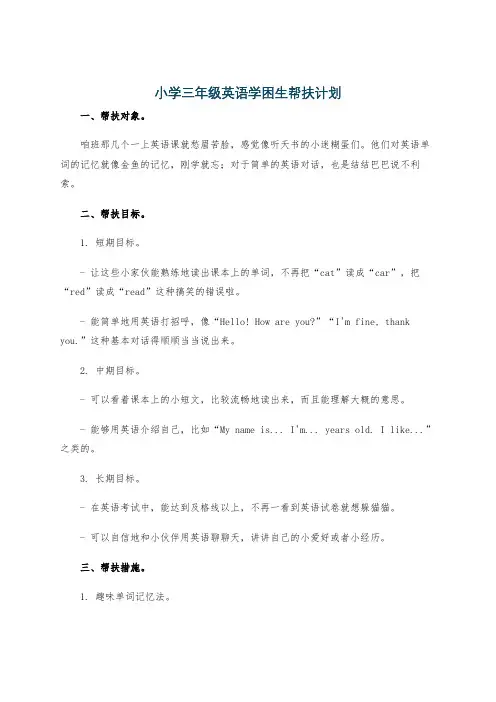
小学三年级英语学困生帮扶计划一、帮扶对象。
咱班那几个一上英语课就愁眉苦脸,感觉像听天书的小迷糊蛋们。
他们对英语单词的记忆就像金鱼的记忆,刚学就忘;对于简单的英语对话,也是结结巴巴说不利索。
二、帮扶目标。
1. 短期目标。
- 让这些小家伙能熟练地读出课本上的单词,不再把“cat”读成“car”,把“red”读成“read”这种搞笑的错误啦。
- 能简单地用英语打招呼,像“Hello! How are you?”“I'm fine, thank you.”这种基本对话得顺顺当当说出来。
2. 中期目标。
- 可以看着课本上的小短文,比较流畅地读出来,而且能理解大概的意思。
- 能够用英语介绍自己,比如“My name is... I'm... years old. I like...”之类的。
3. 长期目标。
- 在英语考试中,能达到及格线以上,不再一看到英语试卷就想躲猫猫。
- 可以自信地和小伙伴用英语聊聊天,讲讲自己的小爱好或者小经历。
三、帮扶措施。
1. 趣味单词记忆法。
- 玩单词卡片游戏。
我会制作一些色彩鲜艳、大大的单词卡片,卡片的一面是单词,一面是对应的图画。
先给他们看图画,让他们猜单词,然后再反过来验证。
这样就像玩猜谜语一样,比干巴巴地背单词有趣多啦。
- 编顺口溜。
比如说“big大,small小,一只cat喵喵喵”。
把单词编成朗朗上口的顺口溜,他们读着读着就记住了,而且还不容易忘。
2. 对话练习。
- 角色扮演。
我们就像小演员一样,把课本上的对话场景演出来。
比如在商店买东西的对话,一个当售货员,一个当顾客。
在这个过程中,他们既能练习口语,又能感受到英语在生活中的实际用处,就不会觉得英语那么枯燥啦。
- 日常对话打卡。
每天给他们布置一个小任务,比如和爸爸妈妈或者小伙伴用英语说一句简单的话,像“Good morning”,然后让家长拍个小视频或者签个字证明完成了任务。
这样慢慢地,他们就习惯用英语说话了。
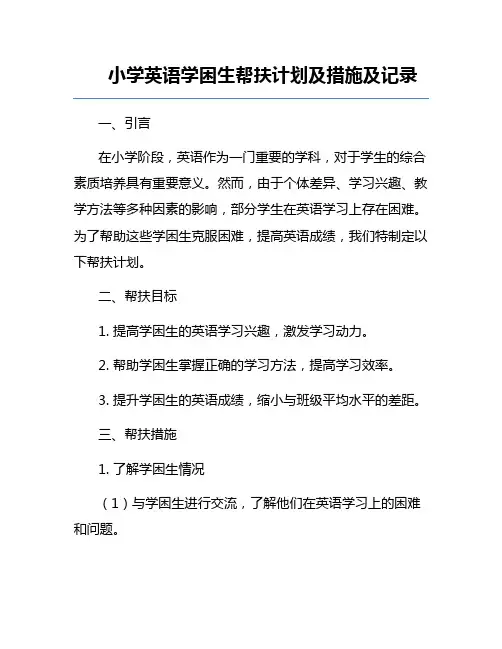
小学英语学困生帮扶计划及措施及记录一、引言在小学阶段,英语作为一门重要的学科,对于学生的综合素质培养具有重要意义。
然而,由于个体差异、学习兴趣、教学方法等多种因素的影响,部分学生在英语学习上存在困难。
为了帮助这些学困生克服困难,提高英语成绩,我们特制定以下帮扶计划。
二、帮扶目标1. 提高学困生的英语学习兴趣,激发学习动力。
2. 帮助学困生掌握正确的学习方法,提高学习效率。
3. 提升学困生的英语成绩,缩小与班级平均水平的差距。
三、帮扶措施1. 了解学困生情况(1)与学困生进行交流,了解他们在英语学习上的困难和问题。
(2)观察学困生在课堂上的表现,分析其学习习惯和方法。
(3)与家长沟通,了解家庭背景和教育环境。
2. 制定个性化辅导方案(1)根据学困生的实际情况,制定针对性的辅导计划。
(2)注重基础知识的学习,巩固学困生的词汇、语法等基本技能。
(3)针对学困生的薄弱环节,进行有针对性的辅导。
3. 创设良好的学习氛围(1)鼓励学困生积极参与课堂活动,提高其学习积极性。
(2)开展小组合作学习,让学困生在互助中提高。
(3)定期组织英语角、英语竞赛等活动,激发学困生的学习兴趣。
4. 加强家校合作(1)与家长保持密切联系,了解学困生在家的学习情况。
(2)指导家长如何辅导学困生,提高家庭教育效果。
(3)定期召开家长会,分享学困生的进步和辅导经验。
5. 落实跟踪管理(1)建立学困生档案,记录其学习进度和辅导情况。
(2)定期对学困生进行评估,调整辅导方案。
(3)对学困生的进步给予表扬和鼓励,提高其自信心。
四、具体帮扶计划及措施以下为具体的帮扶计划及措施:1. 第一阶段(12周)(1)了解学困生情况,与家长沟通。
(2)制定个性化辅导方案,注重基础知识学习。
(3)鼓励学困生积极参与课堂活动。
2. 第二阶段(34周)(1)开展小组合作学习,让学困生在互助中提高。
(2)加强家校合作,指导家长辅导方法。
(3)组织英语角、英语竞赛等活动。
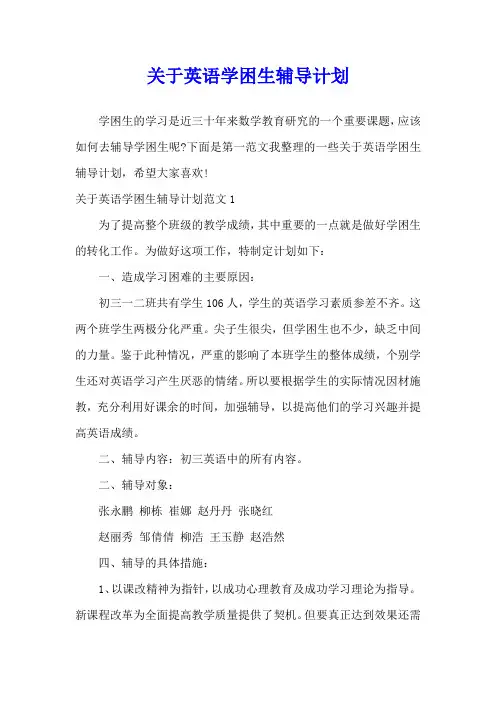
关于英语学困生辅导计划学困生的学习是近三十年来数学教育研究的一个重要课题,应该如何去辅导学困生呢?下面是第一范文我整理的一些关于英语学困生辅导计划,希望大家喜欢!关于英语学困生辅导计划范文1为了提高整个班级的教学成绩,其中重要的一点就是做好学困生的转化工作。
为做好这项工作,特制定计划如下:一、造成学习困难的主要原因:初三一二班共有学生106人,学生的英语学习素质参差不齐。
这两个班学生两极分化严重。
尖子生很尖,但学困生也不少,缺乏中间的力量。
鉴于此种情况,严重的影响了本班学生的整体成绩,个别学生还对英语学习产生厌恶的情绪。
所以要根据学生的实际情况因材施教,充分利用好课余的时间,加强辅导,以提高他们的学习兴趣并提高英语成绩。
二、辅导内容:初三英语中的所有内容。
二、辅导对象:张永鹏柳栋崔娜赵丹丹张晓红赵丽秀邹倩倩柳浩王玉静赵浩然四、辅导的具体措施:1、以课改精神为指针,以成功心理教育及成功学习理论为指导。
新课程改革为全面提高教学质量提供了契机。
但要真正达到效果还需要认真领会其实质,因此一定要认真学习有关理论,做到理论联系实际,改变辅导思路,以学生为服务的对象,坚强服务意识。
2、认真做好后进生的思想工作。
后进生大都是由于基础差,慢慢失去兴趣与信心的,所以要改变他们,首先应激发他们的学习信心和勇气,增强他们的自觉性和主动性,能愉快的学习,体验成功的喜悦。
3、分类对待后进生。
采用个性辅导,并辅以统一辅导。
同是后进生,但其后进原因不尽相同,辅导时必须有的放矢,在深入了解的基础上加强个性辅导,以求最佳效果。
4、充分利用尖子生,通过让他们与后进生结对子,提高改善效果。
对于后进生的辅导,取得好的效果在于一个勤字:勤想,勤谋划,把学生装在心里,因材施教,循序渐进。
五、拟达到的效果:通过辅导能够提高大部分学生的学习成绩,激发学生学习英语的热情,使他们由懒学变为勤学,从而提高全班的学习成绩。
关于英语学困生辅导计划范文2英语学习有困难的学生,指的就是智力正常或接近正常,且处于正常的教学环境,在同等教育中,英语学习水平较低,达不到国家规定的相应英语教学大纲要求的学生。
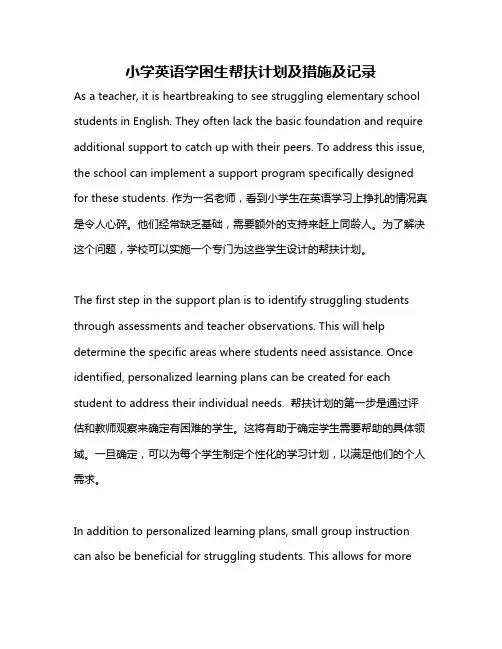
小学英语学困生帮扶计划及措施及记录As a teacher, it is heartbreaking to see struggling elementary school students in English. They often lack the basic foundation and require additional support to catch up with their peers. To address this issue, the school can implement a support program specifically designed for these students. 作为一名老师,看到小学生在英语学习上挣扎的情况真是令人心碎。
他们经常缺乏基础,需要额外的支持来赶上同龄人。
为了解决这个问题,学校可以实施一个专门为这些学生设计的帮扶计划。
The first step in the support plan is to identify struggling students through assessments and teacher observations. This will help determine the specific areas where students need assistance. Once identified, personalized learning plans can be created for each student to address their individual needs. 帮扶计划的第一步是通过评估和教师观察来确定有困难的学生。
这将有助于确定学生需要帮助的具体领域。
一旦确定,可以为每个学生制定个性化的学习计划,以满足他们的个人需求。
In addition to personalized learning plans, small group instruction can also be beneficial for struggling students. This allows for morefocused instruction and opportunities for students to work collaboratively with their peers. Small group instruction can create a supportive and engaging learning environment where students feel comfortable asking questions and seeking help. 除了个性化学习计划,小组指导对于困难学生也是有益的。

教师对大学英语学困生帮扶计划及措施全文共10篇示例,供读者参考篇1Hey guys, let's talk about how teachers can help college students who are struggling with English. Teachers, listen up –we need to have a plan to help these students improve and succeed. Here are some ideas and strategies to consider:1. Provide extra support: Offer additional help outside of class, such as tutoring sessions or study groups. Be available to answer questions and provide guidance when needed.2. Break down complex concepts: Simplify difficult concepts and break them down into smaller, more manageable parts. Use examples and real-life scenarios to help students understand better.3. Encourage practice: Encourage students to practice regularly by assigning homework, quizzes, and other exercises. Practice is key to improving language skills.4. Offer feedback: Provide constructive feedback on written assignments, speaking exercises, and other language tasks. Pointout areas for improvement and offer suggestions for how to enhance their skills.5. Create a supportive environment: Foster a positive and inclusive classroom environment where students feel comfortable expressing themselves and taking risks with their language learning.6. Use technology: Incorporate technology tools and resources into lessons to enhance learning and provide additional support. This could include online practice exercises, language learning apps, and virtual tutoring sessions.By implementing these strategies and providing ongoing support, teachers can help struggling English learners in college improve their skills and achieve academic success. Let's work together to ensure all students have the opportunity to succeed in their English language learning journey!篇2Hey guys, today I want to talk to you about the support plan and measures that teachers can take to help college students who are struggling with English.First of all, teachers can offer additional tutoring sessions to students who are finding it difficult to keep up with the class. These sessions can provide them with extra practice and guidance to improve their understanding of the material.Secondly, teachers can provide students with personalized feedback on their assignments. This can help them to identify their weaknesses and areas for improvement, and give them the opportunity to work on those areas.Moreover, teachers can also create a supportive and inclusive learning environment in the classroom. This can include encouraging students to ask questions, participate in discussions, and seek help when needed.Additionally, teachers can recommend resources such as online tutorials, study guides, and language learning apps to help students improve their English skills outside of the classroom.Overall, by implementing these support measures, teachers can help struggling students to overcome their difficulties and succeed in their English studies. Let's work together to support our classmates and help them achieve their academic goals.篇3Hello everyone! Today I want to talk about something super important – how teachers can help students who are struggling with English in college. It's okay if you're a little lost right now, because I'm here to help you understand.First, let me tell you what a "student with learning difficulties" means. It just means that some students might find it harder to learn English compared to others. But don't worry, because teachers have lots of ways to help them out!One important thing teachers can do is create a special plan just for these students. This plan will have extra activities and resources to make learning English easier. Teachers can also give these students more time to finish their assignments or even have one-on-one sessions to help them understand better.Another great idea is for teachers to use different teaching methods. Some students might learn better through games or songs, while others might prefer reading or writing. Teachers can mix things up to make sure everyone is learning in a way that works for them.And let's not forget about extra support! Teachers can organize study groups or tutoring sessions for students who need extra help. That way, they can work together with other students and feel more confident in their English skills.So as you can see, teachers have lots of ways to help students who are struggling with English in college. Remember, it's okay to ask for help – we're all here to learn and grow together. Let's support each other and make learning English a fun and exciting journey for everyone!篇4Hey guys, today I'm going to talk about how teachers can help college students who are struggling with English. It's super important for us to help each other out, so let's get into it!First off, teachers can set up a support plan for students who are having a hard time with English. This could include extra tutoring sessions, study groups, or even one-on-one help. It's all about figuring out what each student needs and coming up with a plan to help them succeed.Another thing teachers can do is provide additional resources for students who need them. This could be things like online exercises, study guides, or even just extra practice worksheets. The more tools we have to work with, the better chance we have of improving our English skills.And let's not forget about encouragement! Teachers can cheer on their students, praise them for their hard work, and givethem the confidence they need to keep pushing forward. A little bit of positivity can go a long way in helping students overcome their struggles.So, in conclusion, teachers can help college students who are struggling with English by setting up a support plan, providing extra resources, and offering plenty of encouragement. With a little bit of help and a whole lot of determination, we can all improve our English skills together. Let's do this, guys!篇5Hey guys, today I want to talk about how teachers can help college students who are struggling with English. It's like a super important topic because we all know that English can be really tricky sometimes.First of all, teachers can have a special plan just for students who are having a hard time with English. This plan can include extra classes, tutoring sessions, or even study groups where students can help each other out. It's like teamwork makes the dream work, right?Teachers can also make sure to give lots of feedback and encouragement to these students. It's super important to letthem know that they're not alone and that it's totally okay to make mistakes. We all learn by making mistakes, so it's all good!Another cool thing teachers can do is to come up with fun and creative ways to learn English. Like maybe playing games, watching movies, or even going on field trips to practice speaking and listening. Learning should be fun and exciting, not boring and stressful!And last but not least, teachers should always be there to listen and support their students. It's important to create a safe and comfortable environment where students feel free to ask questions and share their thoughts. After all, we're all in this together, right?So yeah, teachers can totally help out college students who are struggling with English by having a special plan, giving feedback and encouragement, being creative in their teaching methods, and providing a supportive environment. Let's all work together to make learning English a super fun and awesome experience!篇6Hi guys! Today, let's talk about how teachers can help college students who are struggling with learning English. Youknow, sometimes it can be really hard to understand all those big words and grammar rules in English class. But don't worry, your teachers are here to help you succeed!First of all, teachers can create a special plan to help students who are having trouble with English. This plan can include extra study sessions, one-on-one tutoring, and even fun games to help you practice your English skills. Teachers can also provide resources like online videos, books, and websites to help you improve your English.Another way teachers can help is by giving students feedback on their work. This means telling you what you did well and what you need to work on. It's important to listen to your teacher's feedback and use it to get better at English.Teachers can also use different teaching methods to help students learn better. For example, they can use songs, videos, and games to make learning English more interesting and fun. They can also encourage students to ask questions and participate in class discussions to help them improve their English skills.In conclusion, teachers play a crucial role in helping students who are struggling with English. By providing extra help, feedback, and using creative teaching methods, teachers cansupport students in their journey to master the English language. So don't be afraid to ask for help and keep practicing, because with the support of your teachers, you can achieve great success in learning English!篇7Teacher is always the best friend of students, especially when we have difficulties in learning. In college, there are always some students who are not doing well in English, they are called "learning-disabled students". But don't worry, teachers never give up on us. They always have plans and measures to help us.Firstly, teachers will have a special plan for thelearning-disabled students in the class. They will give them more attention and care. For example, they will have small group tutoring sessions or personalized study plans for them. They are always there for us, to guide us and support us.Secondly, teachers will provide extra resources for the learning-disabled students. They may give them more exercises, materials or online resources to help them with their learning. They will also encourage them to practice more, so as to improve their English skills.Thirdly, teachers will have regular evaluations for the learning-disabled students. They will monitor their progress and give feedback on their performance. They will also haveone-on-one meetings with them to discuss their strengths and weaknesses, and help them set goals for improvement.In conclusion, teachers always have our back. They are like a lighthouse in the sea of knowledge, guiding us through the tough times. So, if you are a learning-disabled student, don't be afraid to ask for help from your teachers. They will be there for you, every step of the way.篇8Hey guys, listen up! Today I'm gonna tell you all about how teachers can help college students who are struggling with English.First of all, teachers can make a plan to help these students. They can set up special study groups or tutoring sessions just for them. This way, the students can get extra help and support to improve their English skills.Secondly, teachers can give these students extra practice and assignments to help them catch up with the rest of the class.They can also provide feedback and guidance on their work to help them understand where they need to improve.In addition, teachers can create a supportive and inclusive learning environment for these students. They can encourage them to participate in class discussions and activities, and give them opportunities to show their strengths and talents.Overall, teachers can play a big role in helping struggling college students with their English skills. With the right support and encouragement, these students can improve and succeed in their studies. So let's all work together to help each other out and make learning English fun and enjoyable!篇9As a primary school student, I want to share some ideas on how teachers can help college students who are struggling in English. Here are some ways to support them:First of all, teachers can create a supportive and inclusive learning environment for students. This means being patient, understanding, and encouraging to students who are having difficulty with English. Teachers can also provide extra help outside of class, such as holding office hours or setting up study groups.Secondly, teachers can personalize their teaching methods to meet the needs of struggling students. This could involve using different teaching strategies, providing extra resources, or giving students additional time to complete assignments. By adjusting their approach, teachers can help students grasp English concepts more effectively.Additionally, teachers can offer feedback and guidance to help students improve their English skills. This could involve giving constructive criticism on assignments, suggesting ways to practice outside of class, or providing resources for further study. By offering ongoing support, teachers can help students build confidence and make progress in their language learning.Overall, it's important for teachers to show compassion, patience, and understanding towards struggling students. By offering personalized support, feedback, and guidance, teachers can help students overcome challenges and succeed in their English studies. With the right support system in place, all students can thrive and reach their full potential.篇10Hey guys! Today I'm gonna talk about a really important topic which is about how teachers help university students whoare struggling with English. It's super duper cool to have teachers who care about us and want to help us succeed!Okay, so first off, teachers can come up with a plan to help the students who are having a tough time with English. This can include extra tutoring sessions, study groups, or even special assignments that focus on improving English skills. It's like having a super awesome support system to help us get better at English!Next, teachers can also use different teaching methods to make learning English more fun and exciting. They can use games, songs, and videos to help us understand English better. It's like learning while having a blast with our friends!And hey, teachers can also give us lots of encouragement and positive feedback to boost our confidence. It's so awesome to have someone cheering us on and telling us that we can do it!Overall, teachers play a super important role in helping us with our English studies. They not only teach us new things, but they also support us, encourage us, and make learning English an enjoyable experience. So a big shoutout to all the teachers out there who are always there for us and help us become the best versions of ourselves! Thank you, teachers, you guys rock!。

七年级英语学困生帮扶计划及措施一、评估学困生情况在制定七年级英语学困生帮扶计划之前,首先需要对学困生的情况进行全面评估。
评估内容应包括学生的学习情况、学习习惯、家庭环境等因素。
只有全面了解学困生的情况,才能有针对性地制定帮扶计划和措施,从而更好地帮助他们提高英语学习能力。
评估内容:1. 学习情况:了解学困生的英语成绩、听说读写能力等方面的表现,找出他们在哪些方面存在问题。
2. 学习习惯:观察学困生的学习态度、学习方法等,找出他们的学习习惯是否有问题。
3. 家庭环境:了解学困生的家庭情况,包括家庭经济状况、家长对教育的重视程度等,找出家庭因素对学困生学习的影响。
二、制定帮扶计划根据对学困生情况的评估,制定相应的帮扶计划。
帮扶计划应该具体、可行,针对性强,帮助学困生有效地提高英语学习能力。
帮扶计划内容:1. 针对学习问题:针对学困生在英语学习中存在的问题,制定具体的学习目标和改进计划。
2. 针对学习习惯:针对学困生不良的学习习惯,如懒惰、不够专注等,进行个性化的辅导和帮助,引导他们养成良好的学习习惯。
3. 针对家庭因素:对于受家庭环境影响较大的学困生,制定家校合作计划,加强家庭对学生学习的支持和辅导。
三、实施帮扶措施制定了帮扶计划之后,需要有针对性地实施相应的帮扶措施。
实施帮扶措施需要学校、家长以及学生本人的共同努力和配合。
帮扶措施包括:1. 学校支持:学校应当加强对学困生的关爱和帮助,提供额外的学习资源、课外辅导等。
2. 家长配合:家长需要积极配合学校的帮扶计划,关注学生的学习情况,给予他们必要的支持和鼓励。
3. 学生努力:学生本人也需要付出更多的努力,积极参与学校和家长为他们制定的帮扶计划,努力提高英语学习能力。
四、个人观点和理解七年级英语学困生帮扶计划需要全面的评估和细致的实施。
只有通过深入了解学困生的情况,才能制定出更加有针对性的帮扶计划。
在实施帮扶措施的过程中,学校、家长和学生本人需要形成合力,共同努力,才能更好地帮助学困生提高英语学习能力。
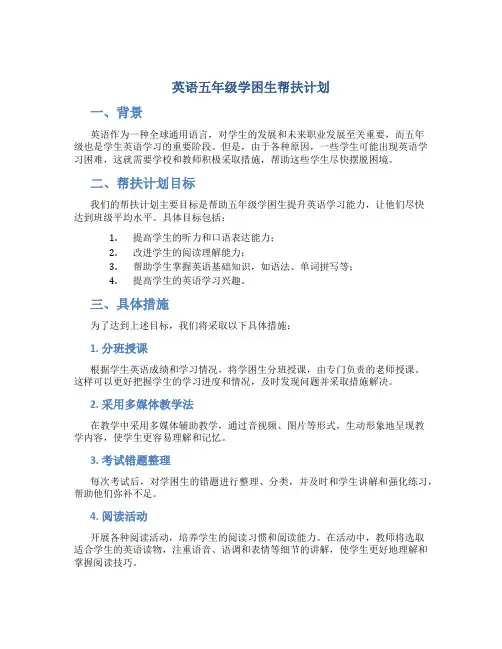
英语五年级学困生帮扶计划一、背景英语作为一种全球通用语言,对学生的发展和未来职业发展至关重要,而五年级也是学生英语学习的重要阶段。
但是,由于各种原因,一些学生可能出现英语学习困难,这就需要学校和教师积极采取措施,帮助这些学生尽快摆脱困境。
二、帮扶计划目标我们的帮扶计划主要目标是帮助五年级学困生提升英语学习能力,让他们尽快达到班级平均水平。
具体目标包括:1.提高学生的听力和口语表达能力;2.改进学生的阅读理解能力;3.帮助学生掌握英语基础知识,如语法、单词拼写等;4.提高学生的英语学习兴趣。
三、具体措施为了达到上述目标,我们将采取以下具体措施:1. 分班授课根据学生英语成绩和学习情况,将学困生分班授课,由专门负责的老师授课。
这样可以更好把握学生的学习进度和情况,及时发现问题并采取措施解决。
2. 采用多媒体教学法在教学中采用多媒体辅助教学,通过音视频、图片等形式,生动形象地呈现教学内容,使学生更容易理解和记忆。
3. 考试错题整理每次考试后,对学困生的错题进行整理、分类,并及时和学生讲解和强化练习,帮助他们弥补不足。
4. 阅读活动开展各种阅读活动,培养学生的阅读习惯和阅读能力。
在活动中,教师将选取适合学生的英语读物,注重语音、语调和表情等细节的讲解,使学生更好地理解和掌握阅读技巧。
5. 口语练习在教学中注重口语练习,让学生多说多练,在纠正语音、语调、语法等方面给予针对性的指导,提高学生的口语表达能力。
四、计划实施和评估我们将在每学期初制定详细的帮扶计划,并严格执行,每月进行一次评估,根据学生的学习情况及时调整教学方法和策略,确保帮扶计划的有效性。
五、总结针对英语学习困难的学生,我们的帮扶计划采取多种措施,从听、说、读、写等多个方面全面提升学生的英语学习能力,让学生更加自信和积极地面对英语学习。
帮扶计划的实施,不仅可以提高学困生的英语成绩和学习能力,更重要的是让他们在学习中感受到关爱和支持,建立起积极向上的学习态度和信心。
# 六年英语学困生帮扶计划背景介绍英语是当今世界最重要的语言之一,在科技、贸易、文化交流等方面具有重要的地位。
而在中国,英语成为国际交流、教育的重点内容,因此,英语绝对是一门重要的课程。
但是,仍然有一些学生在英语学习方面存在很大的困难,有些甚至成为了英语学习的学困生。
为了帮助这部分学生克服学习困难,让他们在英语学习方面取得更好的成绩,学校应该开展六年英语学困生帮扶计划。
方案设计一、试行对象该帮扶计划主要面向六年级英语学科学困生,旨在帮助他们克服英语学习中的困难,提高英语成绩,顺利过渡到初中英语学习阶段。
二、帮扶计划的内容帮扶计划的具体内容主要分为以下几个方面:1.课堂教学方面教师在课堂上要特别关注学困生,尤其是在知识点难度较大的部分,要进行耐心讲解、巩固练习和积累知识点。
可以适当增加学生新知识的相关阅读材料、视频课程等,带动学生的学习兴趣。
2.练习方面为了加强学生的语感和语法能力,教师可以设定英语听写、词汇背诵、语法练习等任务,定期评估学生的学习效果,及时发现问题并进行指导。
3.个性化指导方面每位学生的学习情况都不同,需要根据学生学习的特点和需求,制定相应的学习计划。
在这方面教师可以与学生或家长进行沟通,了解学生英语学习的困难和瓶颈,并制定个性化的学习方案,加强辅导和个性化指导。
4.学习资源方面在学习资源方面,学校可以为学生提供更多广泛的英语学习资源,如英语阅读、英语学习视频、英语听力材料等等,帮助学生更加系统、全面地学习英语语言和文化,提高英语综合应用能力。
三、实施方式帮扶计划的实施方式如下:1.由学校英语教学团队进行组织和领导,各科任教老师积极参与。
2.每位学困生分配一位专职辅导老师,定期制定个性化学习计划,并对学习效果进行监督和评估。
3.开展由专业外教进行的英语课外辅导,并邀请课外英语逐步学习优秀生参加,帮助学生提高英语听说读写综合水平。
预期目标通过六年英语学困生帮扶计划,我们预期达到以下目标:1.将学生英语成绩提高到及格以上,促进学生健康全面发展;2.提供个性化的学习指导,增强学生的自信心和开拓性思维;3.培养学生英语运用能力,为学生未来发展打下基础。
英语学困生帮扶计划一、引言随着全球化的加速,英语作为国际通用语言,在我国的地位日益重要。
然而,在实际教学中,我们发现有一部分学生由于种种原因,在英语学习上遇到了困难。
为了帮助这些英语学困生提高英语水平,我们特制定此帮扶计划。
二、帮扶对象本计划针对的是英语学困生,具体表现为以下几种情况:1. 英语基础知识薄弱,词汇量不足;2. 语法知识不扎实,难以理解句子结构;3. 听力、口语能力较差,无法顺利进行交流;4. 阅读理解能力较弱,对文章内容把握不准确;5. 写作能力欠佳,无法表达自己的观点。
三、帮扶目标1. 提高英语学困生的学习兴趣和自信心;2. 使英语学困生掌握基本的英语知识和技能;3. 培养英语学困生的自主学习能力;4. 提高英语学困生的综合素质。
以下为详细的帮扶计划内容:四、具体帮扶措施1. 了解学生情况,制定个性化帮扶方案(1)与英语学困生进行面对面交流,了解他们的学习需求、困惑和问题;(2)根据学生的实际情况,制定有针对性的帮扶方案;(3)鼓励学生积极参与,提高他们的学习积极性。
2. 加强基础知识教学(1)加强词汇教学,让学生掌握常用词汇和短语;(2)巩固语法知识,让学生能够正确运用语法规则;(3)强化语音教学,提高学生的发音准确性。
3. 提高听力、口语能力(1)组织英语角活动,让学生在实际场景中练习英语口语;(2)开展听力训练,提高学生的听力水平;(3)邀请外教或英语口语较好的同学进行辅导。
4. 培养阅读理解能力(1)指导学生进行课外阅读,提高阅读量;(2)教授阅读技巧,帮助学生更好地理解文章内容;(3)定期组织阅读分享会,让学生交流阅读心得。
5. 提升写作能力(1)教授写作技巧,让学生能够清晰地表达自己的观点;(2)鼓励学生进行写作练习,提高写作水平;(3)定期组织写作比赛,激发学生的学习兴趣。
6. 培养自主学习能力(1)教授学习策略,让学生学会如何自主学习;(2)为学生提供丰富的学习资源,如在线课程、电子书籍等;(3)定期检查学生的学习进度,给予鼓励和指导。
小学英语学困生帮扶计划及措施一、背景分析在我国的小学教育中,英语作为一门外语学科,对于许多学生来说是一项挑战。
尤其是在农村地区,由于教育资源相对匮乏,学生的英语基础普遍较弱,学困生数量较多。
这些学生在英语学习中存在明显的困难,不仅影响了他们的学业进步,也降低了他们对英语学科的兴趣和自信心。
为了帮助这些学困生摆脱困境,提高他们的英语成绩,我们制定了详细的帮扶计划和措施。
二、学困生帮扶目标1. 提高学困生的英语学习兴趣,让他们重新找回学习英语的热情。
2. 加强学困生的英语基础知识,提高他们的词汇量、语法水平和阅读能力。
3. 培养学困生的英语学习方法和技巧,让他们能够自主学习、有效学习。
4. 提高学困生的英语应用能力,让他们能够熟练地进行英语听说交流。
5. 增强学困生的自信心,让他们在英语学习中取得进步,获得成就感。
三、学困生帮扶措施1. 个性化辅导:针对学困生的不同学习需求,制定个性化的辅导计划。
对于基础较弱的学生,重点加强基础知识的学习;对于学习方法不当的学生,指导他们掌握正确的学习方法和技巧;对于缺乏自信的学生,鼓励他们多参与课堂活动,提高他们的自信心。
2. 词汇积累:每天安排一定的时间让学生进行词汇学习,通过记忆单词卡片、阅读英文故事等方式,提高学生的词汇量。
同时,鼓励学生在日常生活中多使用英语,将所学词汇运用到实际生活中。
3. 语法讲解:采用生动有趣的教学方法,让学生在轻松愉快的氛围中掌握英语语法。
通过例句、故事、游戏等形式,让学生在实践中理解和运用语法知识。
4. 阅读训练:提供适合学困生的英语阅读材料,引导学生进行阅读训练。
通过阅读,提高学生的语感,增加他们的词汇量和语法知识,提高他们的阅读理解能力。
5. 口语练习:组织英语角、角色扮演等活动,为学生提供更多的口语练习机会。
鼓励学生大胆开口说英语,提高他们的口语表达能力。
6. 家校合作:加强与家长之间的沟通,让家长了解学生的学习情况,积极参与到学生的英语学习中来。
二年级下册英语学困生帮扶计划一、背景随着教育体制的发展和研究环境的变化,二年级下册的学困生问题日益突出。
这些学生在英语研究方面遇到了各种困难,需要特别的帮助和支持。
为了提高学困生的研究成绩和自信心,制定了以下学困生帮扶计划。
二、目标该帮扶计划的目标是帮助学困生克服英语研究困难,提高他们的研究能力和自信心,促进其在英语学科中取得进步。
三、计划内容1. 学困生认定:根据学生的英语考试成绩、课堂表现和教师评价,确定学困生名单。
2. 辅导班组织:为学困生开设英语辅导班,提供有针对性的辅导和指导。
3. 每周集中辅导:安排每周固定时间集中对学困生进行英语研究的辅导和训练,提高他们的研究效果。
4. 个性化辅导:根据学困生的具体问题和困难,提供个性化的辅导和帮助,帮助他们克服难点。
5. 研究资源支持:为学困生提供相关的研究资源,包括教材、练题和研究工具等。
6. 家长参与:加强与学困生家长的沟通与合作,共同关注学生的研究情况和进步。
四、实施步骤1. 确定学困生名单,并通知相关教师和家长。
2. 组织英语辅导班,安排资深教师进行教学和辅导。
3. 设定每周集中辅导的时间和地点,通知学困生和家长。
4. 根据学困生的具体情况安排个性化辅导和帮助。
5. 为学困生提供相关的研究资源,确保他们有足够的研究材料。
6. 加强家校合作,定期与家长沟通学生的研究情况和进展。
五、预期效果通过该帮扶计划,预计学困生在英语研究方面能够取得明显的提升,提高研究成绩和自信心。
同时,通过家校合作的加强,学困生的学业支持得到有效的延伸,为其未来研究打下坚实基础。
六、总结二年级下册英语学困生帮扶计划旨在针对学困生的实际问题,提供有针对性的支持和帮助。
希望通过该计划,使学困生能够迅速克服困难,提高英语学习能力,实现全面发展。
小学六年级英语学困生帮扶计划介绍本文档旨在提出一份小学六年级英语学困生帮扶计划,旨在帮助学困生克服英语研究难题,提高他们的研究成绩和英语能力。
目标1. 提高学困生的英语研究兴趣和自信心;2. 帮助学困生掌握英语研究的基本技能和知识;3. 增强学困生的英语口语、听力、阅读和写作能力。
计划内容1. 针对学困生的个性化辅导:根据学困生的具体情况,制定个性化研究计划,包括课后辅导、练和复;2. 导师指导:为学困生配备导师,定期与他们进行交流和指导,帮助他们解决研究中遇到的问题;3. 小组研究活动:组织学困生参与小组研究活动,鼓励他们相互合作、共同研究,提高研究效果;4. 鼓励积极参与课堂:鼓励学困生积极参与课堂活动,提高他们的研究兴趣和自信心;5. 提供研究资源:为学困生提供适合他们研究水平和需求的教材、题集和研究资源,帮助他们更好地掌握英语知识;6. 管理研究进展:定期跟踪学困生的研究进展,及时发现和解决问题,确保他们取得持续进步。
实施计划1. 成立英语学困生帮扶小组,包括校领导、班主任、英语教师等;2. 与学生家长进行沟通,了解学生的研究情况和需求;3. 制定个性化研究计划,并与学生本人和家长进行沟通和确认;4. 组织学困生参与小组研究活动,并定期对研究效果进行评估;5. 持续跟踪学困生的研究进展,及时调整研究计划;6. 定期与导师进行交流和指导,共同努力帮助学困生取得进步。
预期成果通过该帮扶计划的实施,预期能够帮助学困生提高英语研究的兴趣和能力,提高他们的研究成绩和自信心。
同时,通过个性化辅导和小组研究活动,学困生将逐渐养成良好的研究惯和自主研究能力,为未来的研究打下坚实的基础。
结论小学六年级英语学困生帮扶计划是一项旨在帮助学困生克服英语学习困难的重要举措。
通过个性化辅导、导师指导、小组学习活动和提供学习资源等措施,我们将努力提高学困生的英语学习兴趣和能力,帮助他们取得更好的学习成绩和未来发展。
小学英语学困生帮扶计划六年级一、计划背景随着教育改革的不断深入,英语在小学阶段的教学地位日益凸显。
然而,在六年级这个关键时期,部分学生在英语学习上存在困难,成绩不理想。
为了帮助这些学困生克服困难,提高英语水平,特制定本帮扶计划。
二、计划目标1. 提高学困生的英语学习兴趣,激发学习动力。
2. 帮助学困生掌握基本的英语学习方法和技巧。
3. 提高学困生的英语成绩,使其达到班级平均水平。
三、帮扶对象本计划针对的是六年级英语学困生,具体包括以下几种情况:1. 英语基础薄弱,成绩长期不理想的学生。
2. 对英语学习缺乏兴趣,积极性不高的学生。
3. 学习方法不当,学习效果不佳的学生。
四、帮扶措施1. 了解学生情况(1)与学生进行交流,了解他们在英语学习中的困难所在,如词汇量不足、语法知识不牢固等。
(2)观察学生在课堂上的表现,发现他们在学习过程中存在的问题。
2. 制定个性化辅导计划(1)针对学生的实际情况,制定个性化的辅导计划,包括学习目标、学习内容、学习方法等。
以下是一个具体的个性化辅导计划案例:学习目标:在一个月内掌握100个新词汇;在两个月内提高阅读理解能力,达到班级平均水平;在三个月内提高写作能力,能够独立完成一篇小作文。
学习内容:每天学习10个新词汇,并进行复习;每周进行一次阅读理解练习;每两周进行一次写作练习。
学习方法:利用课后时间进行辅导,每周至少两次;通过微信群、电话等方式与学生家长保持联系,了解学生在家学习情况;鼓励学生参加英语角、英语竞赛等活动,提高学习兴趣。
3. 落实辅导计划(1)按时进行辅导,确保学生完成学习任务。
(2)及时检查学生的学习进度,针对问题进行针对性指导。
以下是一个具体的辅导案例:学生情况:小王,六年级学生,英语成绩倒数,对英语学习缺乏兴趣。
辅导过程:第一次辅导:了解小王的学习情况,发现其词汇量不足,阅读理解能力较弱。
第二次辅导:针对小王的问题,制定个性化辅导计划,包括每天学习10个新词汇,每周进行一次阅读理解练习等。
英语学困生帮扶计划-CAL-FENGHAI.-(YICAI)-Company One1
小学英语学困生帮扶策略
英语学习有困难的学生,在同等教育中,英语学习水平较低,达不到国家规定的相应英语教学大纲要求的学生。
他们当中有些是英语能力的问题,指那些比其他学生要花费更多的时间和精力才能勉强掌握英语知识和技能的学生;有些是因有其他问题,例如,学习英语的环境、动力以及兴趣、信心等心理问题;另外还有英语的基础不扎实等知识积累问题。
英语学习中的学习困难学生,主要有以下表现特征:
1.对口语交际说不清其来龙去脉,只能照搬硬套,不能灵活应用,稍作变化则不知其然。
2.听课时缺乏主动思考,往往只是注意结论,不深究其形成过程,遇到困难消极等待。
3.自学时,找不出问题的重点和难点,不能整理出教材所叙述的内容,提不出问题,看书时注意力不集中。
4.做作业时,不按题目的意思,不懂装懂,转化能力较差。
针对这么多的原因分析,我们应该如何去解决呢?
1.我们应在平时上课中,有意强化英语学困生对英语的敏锐感,多引导他们对英语现象的观察和思考。
如多做一些有趣味性的英语题目,多做一些带有图形图像的直观性题目。
2.故事、游戏、现实生活场景都是学生最容易接受的学习方式。
通过有趣的喜闻乐见的场景引入课题,可以牢牢地吸引他们的注意力,学生仿佛自己进入了故事情景中,不由自主地产生了强烈的探究欲望。
3.以合作交流促思维合作学习不但可以培养学生团结合作、沟通与交流的能力,而且有利于激发和促进学生思维的发展,特别是学困生思维的发展。
这样使他们得到了帮助,能力也得到了提高。
4.培养英语学困生的学习兴趣。
培养学生对英语学科的兴趣,感受和欣赏英语学科的魅力,形成自觉学习和追求新知识的倾向是转化学生英语学习困难的策略之一。
只有当学生通过自己的努力获得了进步,掌握了一定的英语方法,才能感受成功的快乐。
我们在英语教学中,首要问题就是激发学生学习英语的兴趣。
培养学生英语学习兴趣的途径很多,主要来说,可以考虑以下几点。
(1)降低学习要求
英语困难生基础差、思维能力弱,因此教师在讲课时要注意从简入手。
讲解知识时尽量分散难点,对他们尽量提问简单的问题,让他们上黑板板演时也适应从他们的实际能力。
对于英语作业,应以课本为主,不搞偏题、怪题,题量要适中,适当给
予模仿性练习的机会,并加强一些变式训练,以提高学习英语的兴趣。
(2)进行直观教学
课堂教学应加强直观性,通过直观教学的方法,如运用英语卡片,教材附带的学具,老师自制的工具,投影仪,多媒体等,化难为简、化抽象为具体,加深学生对英语概念、性质的理解和掌握,提高解答能力。
(3)积极关注学困生
要特别注意观察英语学困生的学习情绪,英语学困生往往上课思想开小差、不集中,他们对教师按部就班的讲解,枯燥无味的语言听不进耳,对英语知识也不感兴趣。
我们应恰当运用特别提醒的艺术性的教学语言来引起他们的注意,引导每位学生进入积极的学习状态,从而达到教学目的。
5.增强英语学困生的自信心
英语学困生由于学习差,往往信心不足,容易产生悲观失望的自卑心理,从而对英语产生恐惧心理。
(1)多鼓励,常表扬。
在课堂上多说一些鼓励性的话语,如:super,great,cool,“这个想法不错,再想个更好的”;在作业批改中多批上一些:“good”,“best”,“你的字写得真工整,继续保持”。
评价的内容尽量具体些,让他们觉得老师是真心的在表扬他们,从而增强继续学习的动力和认为自己可以学好的信心。
(2)以成就感保持自信心。
在进行教学和课后辅导时,要有意识地出一些比较简单的题目,以培养他们的信心,让他们能够品尝到成功的喜悦,让他们感到,只要努力学习、方法得当、持之以恒,自己完全可以学有所得、取得好的成绩。
给学困生表现的机会,给予点拨和启发,使学困生享受到成功的喜悦,从而培养了他们的自信心和自尊心。
6.建立与英语学困生和谐的师生关系
和谐的师生关系是保证和促进学习的重要因素,特别要对学困生热情辅导,真诚帮助,从精神上多鼓励,学法上多指导,树立他们的自信心,提高学习能力。